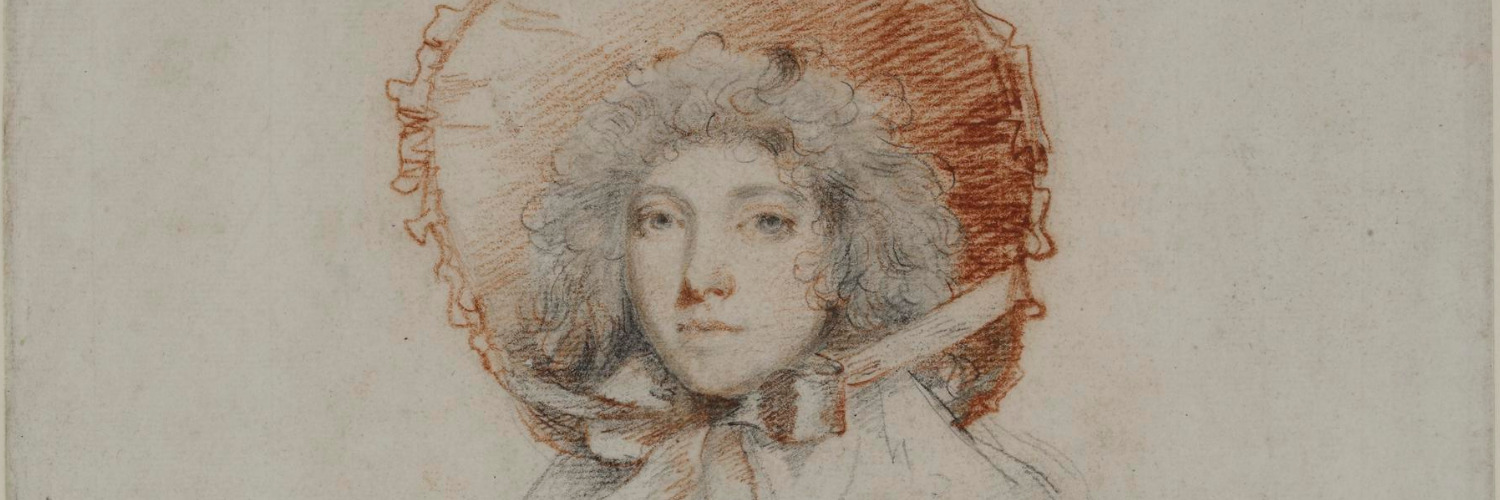Nobody.
a
Comedy~
in
Two Acts.
[Transcribed from the only known, surviving manuscript of Nobody (LA 1046), this play is reproduced by permission of The Huntington Library, San Marino, California, all rights reserved. Further reproduction of this text (including on the Internet) is prohibited without prior permission from The Huntington Library. Mary Robinson’s Nobody was first performed on 29 November 1794 at the Theatre Royal, Drury Lane. Except for the Prologue and Epilogue (see note 4), the play was not published.]
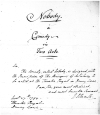
This Comedy, called Nobody, is designed, with the Permission of The Marquis of Salisbury,
to be acted at the Theatre Royal in Drury Lane.
I am, Sir, your most obedient,
and most humble Servant –.
J. P. Kemble.
Theatre Royal
Drury Lane.
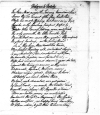
Prologue to Nobody.
[The Prologue and Epilogue to Nobody, spoken by William Barrymore (1759-1830) and Dorothy Jordan (1761-1816), respectively, were published on 3 December 1794 with slight variations in the “Poets Corner” section of The Morning Post and Fashionable World. As The Morning Post’s footnotes to the Prologue and Epilogue indicate, lines in both of them were omitted on the second night’s representation, the Prologue due to concerns over length and the Epilogue due to Dorothy Jordan’s inability to speak them. The Prologue was also published on 3 December 1794 in The Sun and in The True Briton, with additional variations. The Prologue and Epilogue were also published together in the 2 December to 4 December 1794 edition of The Whitehall Evening Post.]
The Storm that sweeps the Tow’ring mountain’s head,Spares the low Tenant of the clay-built Shed;While his meek Offspring, hid from ev’ry Eye,Shrinks, as the howling tempest passes by;Creeps to his Parents’ fostring arms, and steals, 5The only warmth, the little Trembler feels;Warmth that can more than mortal bliss impart,The glow of kindness, – in the feeling Heart!So, in these busy, these disastrous times,When fateful Thunders roll, o’er distant climes,10To you for shelter flies, o’erwhelm’d with fear,An humble fugitive, – once favour’d here;
An humble fugitive, once favour’d here: a reference to the author of Nobody, Mary Robinson, who had been a highly successful actress on the Drury Lane stage from 1776-1780.–
With fond remembrance charm’d, again she tries,To paint the living manners as they rise;
To paint the living manners as they rise: a near quotation of “And catch the manners living as they rise” from Epistle I, l. 14 of Alexander Pope’s Essay on Man (1773). In his edition of Nobody, William D. Brewer points out that Robinson also incorporates Pope’s line into Modern Manners, A Poem. In Two Cantos (II.6); see Brewer, ed. The Works of Mary Robinson, Vol. 8 (London: Pickering and Chatto, 2010), 275n. Published the year prior to Nobody (London: James Evans, 1793), Modern Manners links voguish culture with gambling practices.To deprecate, by Zeal, the frown severe15Whatever reigns abroad – let peace be here!At Nobody we level Satire’s thorn,We trust, such characters, are yet unborn;No Pencil Traits; – we mark, the broader line,Hogarth may please, – tho’ Reynolds is divine!
Hogarth . . . Reynolds: William Hogarth (1697-1764), English printmaker, painter and visual satirist; Joshua Reynolds (1723-1792), English portraitist and the first president of the Royal Academy of Arts. Reynolds painted portraits of Robinson in 1782 and 1783, and Robinson, in turn, paid homage to him in her poems “To Sir Joshua Reynolds” (1789), Ainsi va le Monde (1790), and Monody to the Memory of Sir Joshua Reynolds, Late President of the Royal Academy (1792). In Ainsi va le Monde she writes, Reynolds, ’tis thine with magic skill to trace The perfect semblance of exterior g…20
Alone our author comes; no master’s AidHas touch’d the light, or Harmoniz’d the Shade.Authors are poor; no happy hours have they,No Golden stores, to gild their toilsome day;
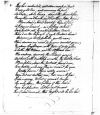
They live unheeded; yet when sunk in dust,Envy will die; and memory be just!And hope, while living, chears the favour’d few,Warms their sad hearts, and bids them turn to you.Where shou’d a timid trembler hope to find5A Judge so lenient, – as a feeling mind?Here Justice sits, by native freedom drest,Thron’d on the bulwark of each Briton’s breast.And you, ye lovely polish’d, gentle race;Whose charms are rival’d, by your mental grace,10Ye whose bright eyes, with tears of pity glow,To bathe the Widows, and the Orphan’s woe!Who weeping, decorate the Soldier’s grave,And bind, with deathless wreaths, the Godlike brave.When Satire shews the portraits, fancy drew,15Sure Nobody will say, they’re meant for you.Nobody frowns! there’s nobody severe!None but our Author now, has cause to fear,If she is wrong, ’tis but a venial crime;She only apes, the follies of the Time.20I am her pleader, let her not be cast,For if she’s damn’d, this Night will be her last.
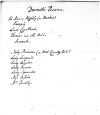
Dramatis Personæ.
-
Sir Henry Rightly (a Banker)
-
Sharply
-
Lord Courtland.
-
Thomas (an old Butler)
-
Servants.
-
Nelly Primrose (a West Country
-
Girl)
-
Lady Languid
-
Lady Rouleau
-
Lady Farrow
-
Lady Squander
-
Miss Cassino
-
Mrs. Goodly.
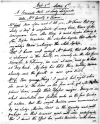
Act 1st Scene 1st
A Servants Hall at Lady Languids
Enter Mrs. Goodly & Thomas.
Mrs. Good.
How often must I tell you, Mr. Thomas that my Lady is Deaf to complaints of every kind, Women of her consequence have other things to mind besides listning to other Peoples Vexations: the smallest Surprize that attacks my Lady’s Nerves unhinges the whole System.
Thos.
I know well enough Mrs.Goodly, that all System is unhinged in this Family, we scarcely see the Sun from November to February, we rise at noon, and go to bed at Day break. My Lady has kill’d three waiting women already, and the fourth is now upon Trial.
Mrs. G.
Poor young Thing! I griev’d last night when she arriv’d. The Roses on her face will not retain their places long, unless their Possessor resigns – Mercy on us, what devastation does fashion make in the fair Garden of nature. But this simple Maiden comes recommended by my Ladys Maiden Aunt in the Country and will perhaps on that account meet with some indulgence tho’ I dread the Effect her rustic Manners will have [Page 5]
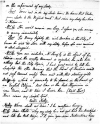
on the refinement of my Lady.
Thos.
’Twas not so in my Lords time; He knew that Virtue gave Lustre to the Highest rank! But since my Lady has been a Widow—
Mrs. G.
She won’t remain one long, I assure ye; she means to marry immediately
Thos.
Sir Henry Rightly the rich Banker in the City, I know he was in Love with my Lady before she was married to Lord Languid.
Mrs. G.
You are mistaken, Mr. Sharply is the object of her Choice – and the worthy Baronet is rejected, She calls him nothing but the City Cynic, I had great mind to tell her Ladyship the other Morning that the Tinsel of Fashion would not pass current unless ’twere mix’t with that sterling gold Integrity which is generally to be found in the breast of an English Citizen. But time is the best Physician in some Cases, and to time I leave her. (Exit Thos.)
Here comes my Simple Girl.
Enter Nelly.
Nelly.
When shall us Dine? I be monstrous hungry.
Mrs. G.
Dine Child! why my Lady has not yet had her Breakfast and till her Bell Rings, I’ll give you some Instructions how [Page 6]
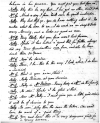
to behave in her presence. You must put your best face on.
Nelly.
Why this be my best – I ha’ got no other, won’t it do.
Mrs. G.
Alack-a-day
I fear ’twill soon be spoilt in London.
Nelly.
Why lord bless ye, you do know nothing about it – No matter what be done to un – I do wash un wi Soap & Suds every Morning, and a looks as good as new.
Mrs. G.
Very likely; but your face won’t last forever.
Nelly.
Ifecks
it has lasted a good bit, for father always did say ’twas Grandmothers own face, and she ha been dead these 50 years.
Mrs. G.
Now be Serious.
Nelly.
There, I be – this be the way I look when I do hear a Sarmant.
Mrs. G.
What is your name, Child?
Nelly.
Nelly Primrose at your Service
Mrs. G.
Nelly, or Mrs. Primrose – Every body is Mrs in this family.
Nelly.
No sure! Efecks I be glad o’ that.
Mrs. G.
Now Mrs. Nelly – I must give you a little good advice[.] it will be of Service to you
Nelly.
No sure! Why then the more the better, One can’t have too much of a good thing.
Mrs. G.
You must know this is a very dangerous place for a Young Woman.
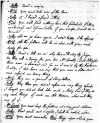
Mrs. G.
You will find nothing here but falsehood, flattery[,] wickedness, and dissimulation, if you escape,
it will be a Miracle
Nelly.
Let me go home again. I won’t tarry – I be afeard
Mrs. G.
All the fellows will be in Love with you, and dying for you.
Nelly.
Don’t e tell me so! why then I’ll stay by Jingo: Be they all a Dying for you too, Mrs. Goodly? Ecod
I thought there was a Summat
in’t, for as I com’d by the Footmans Pantry, I did hear un say that you was a bitter soul and refus’d un Every thing.
Mrs. G.
They are a parcel of Story-tellers.
Nelly.
Why then you did n’t refuse un any thing efecks I thought you did n’t look like such a body: but if they do say such things of such an Old Woman, what will they say of I.
Mrs. Good.
You must keep the footmen at a very great distance
Nelly.
What quite out o’ sight; I shall be unkid
alone.
Mrs. G.
You must remember three things upon which your [Page 8]
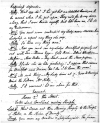
happiness depends –
Nelly.
Won’t one do? I ha got but an Addled brain, an I be mazed
when I be put upon. They us’d for to say down a long,
that I was beside myself.
But let’s hear un, I’ll do my Endeavours.
Mrs. G.
You must never contradict my Lady, never answer her Ladyship, or repeat any thing she says.
Nelly.
Is there any thing more?
Mrs. G.
Now you must see my Ladys Breakfast properly set out with Tea – Plovers Eggs – Cold Ham – Potted Wheatears
– Muffins – New Butter – Dry Toast – and the News papers.
Nelly.
Efecks she do like junketing!
I suppose that serves for Breakfast and Dinner too? Be I to have the same?
Mrs. G.
No such thing – My Lady dines at 7 – Now to Business[.] Mind the Fellows, Mrs. Nelly.
Nelly.
I’ll warrant! let me alone for that.
Exeunt.
Scene 2d. the Street.
Enter Lord Courtland meeting Sharply.
Lord C.
What Course art thou Steering, Sharply – to the Temple of Plutus,
or the Shrine of Beauty?
Sharp.
You mean my Bankers & Lady Languids. The former [Page 9]
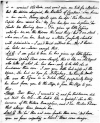
is a comical Old Quiz,
and won’t give me tick for a Rouleau,
but the divine Languid, the liveliest of Creatures! Love beams in her smiles. Honey dwells upon her Lips! Ten thousand Cupids hover round her! By Jove her Eyes are Saphire! her Cheeks two blushing Roses – I’ve given up little Cassino entirely – no, no, the Widows the neat thing! but I am struck when ever I see her, Mute as a Statue! perfectly choak’d with Admiration – I can’t Exist without her – tho’ I know she hates me – Queer enough that.
Ld C.
I am glad to hear he has given up little Cassino. however
Come come Sharply, this is like an old Coquet who talks of what she has been – only to be told she is handsomer than ever. I saw you both last night at the Opera, She had no Eyes for Hilligsberg
– No Ears for Banti
She was the Figure in a Dutch Clock
– perpetually turning her head from you to the Stage, & from the Stage to you thus.
Sharp.
Poor thing, I remark’d it, and for that Reason did not Visit her box
– She look’d like a Goddess! She is the Aurora
of the Western Hemisphere, and I am the Sun Flower that always turns towards her.
Lord C.
Ha! ha! thou art more frantic than ever! But have you no fears respecting a Rival! theres some danger.
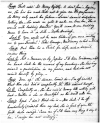
Sharp.
That’s odd! Sir Harry Rightly. O don’t fear a legion, no, She has too much Taste not to give me the preference. Sir Harry only wants her fortune – Lucre! damn’d dirty Lucre. Nothing Else – She needs no gold to make me love her, “She is cover’d with budding Beauties”
You’ll come to our wedding[.] Mean to have it in Stile – Drolle Business.
Lord C.
You could not be more triste
– if you were inviting me to your Funeral! Take Courage, Matrimony is but a trial.
Sharp.
But then tis a Trial for Life, and a damn’d serious thing.
Lord C.
Not a Murmur, or by Jupiter
I’ll turn Evidence, and her hand shall be the reward of my treachery. She has long evinc’d a predelection in my favour, and had she not ruin’d herself by play. –
Sharp.
Done up! Oh! damme twon’t do – I’m off.
What then she’s Dish’d compleatly,
Eh! thats comical Enough.
Ld C.
Compleatly so – She has rais’d Money till nobody will lend – Neither is she so Beautiful as the world calls her.
Sharp.
Egad I don’t think she is – How shall I be off handsomely
So then my lord, She is fond of you, Eh! faith drole enough! Curse me if I’ll have any thing to say to her, I resign her most willingly.
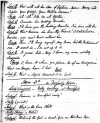
Lord C.
What with all her store of Saphires – Roses – Honey and Cupids, Your Goddess, Your Western Aurora?
Sharp.
All! All, take ’em all together.
Lord C.
Consider her budding Beauties
Sharp.
I’ll leave you the budding Beauties, I’ve done with her
Lord C.
What because she loves thy Friend? O Antidiluvian[.]
besides – you can’t Exist without her.
Sharp.
Then I’ll hang myself – Any Noose but the Matrimonial one. It won’t do – I’m not up to it.
Lord C.
It grows late – May I leave my name at Lady Languids
Sharp.
O leave it where you please, tis of no consequence[.] What an Escape have I had.
Exit
Lord C.
What a stupid Coxcomb it is.
Scene 3d. a Dressing Room.
Lady Languid – Nelly waiting. at Breakfast.
Lady L.
Primrose is Breakfast ready?
Nelly.
(points)
Lady L.
What is the hour Child.
Nelly.
(brings a Watch)
Lady L.
Certainly the Girl is dumb – Give me that News Paper.
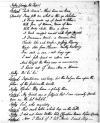
Nelly.
(brings the Paper)
Lady L.
“Poets Corner”
– What have we here.
(Reads) Pray tell me what is this ye ScholarsA Thing made up of Boots & Collars;With face of Woman, Voice of ManWith Body shorter than a Span
Span: The maximum distance between the tip of the thumb and the little finger when the hand is fully splayed, generally taken to be about nine inches.A Neck wrapp’d round with large Cravat5A Drummers Braid,
Drummer’s Braid: regimental fabric trimming.a Beaver Hat.
Beaver Hat: a hat made of felted beaver fur.Cheeks like red Wafers, puffing, blowingWords stole from Phrases – vastly knowingFor such a one – not long agoI met full speed in rotten row
rotten row: Rotten Row is a wide path located on Hyde Park’s south side, now maintained as a bridleway. During the eighteenth century, the fashionable set were known to parade up and down the broad avenue in their carriages and on their horses in an effort to see and be seen.10
And thought the thing was so uncommonI knew not if ’twere Man or Woman.
Nelly.
Ha! ha! ha!
Lady L.
Impertinence and Envy, but the Vulgar live upon the follies of the fashionable World.
Nelly.
Efecks! they have a plenty then.
Lady L.
My Spirits are so fatigu’d that I can scarcely Speak. Give me the Sal Volatile.
Nelly.
Sal. who my Lady.
Lady L.
That small bottle which lays on the Table
Nelly.
I did not know bottles had Christian names before.
Lady L.
Now I think if I had Music I cou’d Sleep – [Page 13]
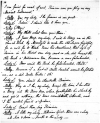
I am faint for want of rest. Primrose can you play on any Musical Instrument?
Nelly.
Yes, my Lady, I be famous in our parts
Lady L.
Indeed! I shou’d like to hear you.
Nelly.
(Plays)
Lady L.
Why Child what have you there?
Nelly.
A Jew’s Harp,
my Lady, I us’d to twang un in the church Porch
by Moonlight to make the Old Saxon
frightful; for a us’d for to think ’twas
his Sweetheart, that dy’d of Quince in her throat
one day, and so she did haunt the Old Porch o’ Midsummer Eve, because a was falsehearted.
Lady L.
How cou’d the Porch be falsehearted, Child?
Nelly.
Because if a hadn’t Ould Scratch wou’d ha fetch’d un – as a did Doctor Foster!
Oh!
Lady L.
You shou’d be charitable Primrose
Nelly.
Why so I be, my Lady, Many’s the time I ha slid a Penny into the Poors Box,
when Gentlefolks ha slunk by and giv’d nothing; tho’ ’twas cover’d with Cobwebs, and I be mortal fear’d
o’ Spiders.
Lady L.
Canst thou sing Primrose
Nelly.
A little my Lady – Williams Ghost – there was a Lady all Skin & Bone – Death & the Lady
–
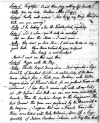
Lady L.
Frightful! Cans’t thou sing nothing less horrible?
Nelly.
Yes, my Lady, Barbara Allen
(Sings)
Lady L.
Vastly well indeed! Now bring my Harp, there it is. Well, are you coming?
Nelly.
I be looking a’ter the Fiddlestick,
my Lady.
Lady L.
Let it alone – you’ll only do mischief. Let me hear the News – I can’t read. –
Nelly.
Why don’t ye larn then, I did use to see in my good book.
When House & Land be gone & SpentThen larning is most Excellent.
When House & Land be gone & Spent / Then larning is most Excellent: a proverb made popular in Samuel Foote’s comedy Taste (1752) by the character Lady Pentweazel who states, “When house and land are gone and spent, / Then learning is most excellent” (1.1). David Garrick later echoed the phrase in his prologue to Oliver Goldsmith’s comedy She Stoops to Conquer (1773): “When ign’rance enters, folly is at hand; / Learning is better far than house and land.”
Must I read un thro’ and thro?
Lady L.
Begin with the Play.
Nelly.
Theatre Royal Drury Lane – Just imported a large Quantity of Excellent Spirits – A certain Lady of the Beau Monde – Stray’d from a Field near Hackney
– with Twelve waggon Loads of Flannel Shirts – for our gallant Troops on the Continent (I hope they’ll arrive safe with all my Soul) At Mrs. Cassino’s last Ball – no one was more Admir’d for Beauty – than the Arabian Savage & the Kangaroos – The best Concert this year was perform’d by the Brunswick & the Vengeur
(I suppose that was a French Tune) The Piece concluded with Rule Britania – Gone Off, a large quantity of Indian Crackers
– “whoever will bring them back?
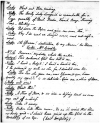
Lady.
What art thou reading.
Nelly.
The lovely Lady Languid is remarkable for a large quantity of Pearl, Powder, French Rouge, Shaving Soap – Blacking
–
Lady.
Put down the Paper, and give me some Tea. –
Nelly.
Why do I read un straight acros, and not miss a word.
Lady.
Oh Essence!
destruction to my Nerves! tis Poison
Enter Mrs. Goodly.
Mrs. G.
Heavens! my Lady, whats the matter.
Lady L.
This awkward Girl has kill’d me.
Nelly.
I han’t a budg’d! I han’t a touch’d her. I be poison’d as well as she, for I drink’d some too.
Lady.
The Tea she gave me, was Essence, & and you know Goodly my appetite is so delicate – Give me a Slice of Ham.
(Nelly cuts some)
Lady.
Whats this?
Nelly.
A Slice of Ham, & as nice a kissing Crust
as ever was cut off a Loaf.
Lady.
Take it away.
Nelly.
Better late than never – ’tis an ill wind that blows no-body good
– I shou’d have giv’d up the Ghost in the twinkling of an Eye.
(Exit Mrs. Goodly)
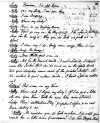
Lady.
Primrose! I’m at home
Nelly.
Yes, my Lady, I see you be.
Lady.
I see Company.
Nelly.
Where my Lady?
Lady.
Here, in my Dressing Room
Nelly.
Don’t ye say so – be they Spirits – I be afeard to Budge Sure she be craz’d! Why you do look as pale as a Ghost.
Lady.
I dare say I do – bring some rouge there it lays.
(Nelly brings the Rouge)
Lady.
Now Child, put some on.
Nelly.
Not for the Varsal World
– I can’t abide it – I shou’d seem like Isabel, that one do read on, in the good Book[.]
Did your Ladyship never read of the painted Isabel
– Oh! ’tis wicked to spoil natures Works – I han’t a got no notion on’t.
Lady L.
Put some on my Face.
Nelly.
Where shall I begin, my Lady? If I do put a little all over your Face! ’twill be more like mine.
(Paints)
Nelly.
No wonder you do look so glum – I do wish you wou’d be a little more Gamesomer.
I do love People that [Page 17]
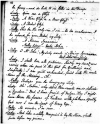
be funny – and do hate to see folks in the Dumps
Lady.
Give me a Glass
Nelly.
A Wine Glass, or a Beer Glass
Lady.
A Pocket Glass.
Nelly.
This be the only one I see – tis too cumbersome I be afeard, for your Pocket, my Lady
Lady.
A Mirror Ignoramus
Nelly Rings – Enter John
Nelly.
O Mr. John! My Lady wants a Mirror Ignoramus.
Exit John laughing.
Lady.
I shall lose all patience, Surely my Aunt was raving when she prais’d this Girl for Gentleness and Simplicity! I am quite exhausted, faint with the irritations of the Morning – Oh!
Nelly.
Perhaps you be hungry, my Lady.
Lady.
Oh! Nature! why did’st thou create me so delicate a Creature? Had I been form’d of Vulgar Clay I might have borne the frowns of Fortune with plebean Apathy but now I am the Sport of Every Eye!
Nelly.
No wonder I’m sure.
Lady.
And like a Lilly Vanquish’d by the Storm, shall fade before my prime.
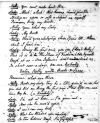
Nelly.
You must make haste then.
Lady.
Alack! alack! that heaven shou’d practice Stratagems upon so soft a Subject as myself, Primrose, bring my Boots.
Nelly.
Your what my Lady.
Lady.
My Boots
Nelly.
Wou’d your Ladyship chose Spurs too
– Where shall I find ’em.
Lady.
Bring the first pair you see. (Exit Nelly) This it is to be the Slave of Fashion! Our Equals laugh at us – Our Inferiors don’t understand us[.] In short now-a-days, we are Nobody
Enter Nelly with Boots. & Spurs
Heavens! what are these.
Nelly.
Boots, my Lady, they be a little grim’d or so, but you did bid me bring the first pair I did light on; and here they be.
Lady.
I’m not at home. – I’m gone out
Nelly.
Now she be craz’d again.
Lady.
I can’t see any body.
Nelly.
What has blinded you my Lady?
Lady.
In this hideous Dress, I’m frightfull
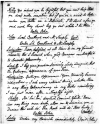
Nelly.
Yes indeed you be frightful, but you can’t help that[.] we don’t make ourselves; but if you’ve a mind to hide under yon Table we a Petticoate, I’ll stand afore ye and ecod, they shant lug ye out while I be there.
Enter John
John.
Lord Courtland and Mr. Sharply.
Exit.
Enter Ld. Courtland & Mr. Sharply
Lady. Lan.
I am delighted at all times to see my friends amus’d, tho’ I lament when good manners are Sacrific’d to Sarcastic pleasantry.
Lord C.
I beg your pardon Sincerely, Lady Languid, but the Grotesque Appearance of your Face.
Lady Lan.
Grotesque Appearance! Your Vivacity becomes ridiculous – I ask every rational Being, whether there is any thing Extraordinary in my looks considering
I am just risen after a Sleepless night.
Sharp.
Ha! ha! ha! devilish Comical Efaith!
Never saw any thing more drole, allow me to convince you – Damme this will do! The Boots will do! How lucky!
Enter John
Lady.
Order my Curricle
immediately. (Exit John) [Page 20]
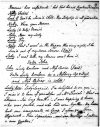
Heavens! how unfortunate! but that horrid Creature Primrose
Nelly.
(hides)
Lord C.
Don’t be alarm’d Child: Her Ladyship is all good nature.
Nelly.
When your Honour
Lady.
(to Nelly) Vanish
Nelly.
How my Lady
Lady.
Fly.
Nelly.
That I wool in the Waggon
this very night; I be Scar’d out of my Seven Senses.
(Exit)
Lady.
I can’t talk, my Nerves won’t bear it.
Enter John
John. Lady Rouleau and Miss Casino.
Enter Lady Rouleau in a Military Cap & Dress. and Miss Cassino in white)
Lady Rou.
Lady Languid; I’m delighted to see you – I griev’d to hear of your Losses at Mrs. Trivials! What an absence – Six long Months! – I was Expiring to know who was parted, and who had come together – We have had our amusements in Camp,
I assure ye – Four Elopements – Five Seperations – and one Marriage – I return a new Creature!
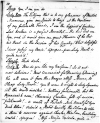
Sharp.
Yes, I see you do
Lady Rou.
The Fatigues that is to say pleasure of Martial Maneuvres,
give me Spirits to laugh at the Vexations of my fashionable Friends, I am the happiest of Creatures[.] Lord Rouleau is a perfect Hannibal
– He has lost an Eye, and it wou’d give me great Pleasure if he lost his Head in the Service of his Country! What delightful Ideas possess my Brain! Apropos – poor Lady Paroli is quite ruin’d!
Sharply.
That’s drole.
Lady R.
How do you like my Uniform?
Is it not most delicious? Most convenient for Dancing – (Dancing) We all wear it from the Meagre Miss Macas, to Plump Lady Paroli! You’ll come to night to Lady Squanders[.] All the World invited! – Nothing fashionable but the Brunswick rose!
Charming Creature, full of accomplishments! – a world of Talents – Such Beautiful Eyes[.] Dark Blue! Order’d a Habit
Exactly the Colour to ride a Race to morrow against Charles Winlove, bewitching wretch! Apropos! Miss Nerissa Vaivete, quite a [Page 22]
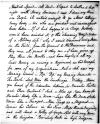
Martial Spirit – All Soul – Eloped to Scotland last night with Harry Lovemore! now I dare say there are People ill natur’d enough to go about telling Every body – We who are prudent and circumspect know better – If it had happen’d in Camp, Nobody wou’d have minded it. O the charming Visissitudes of Military Life! why I wou’d command every Man in the Field, from the General to the Drummer and they were all proud to obey me. – I have given up Play these Six Months – and have Employ’d all my lords Money in raising a Regiment, no bad Example for some of my Acquaintance – Rub-a-dub. was my Morning Concert – Pop! Pop! my Evening Serenade – The Parole! Lord Howe the Countersign – Victory
– Have you heard of the Adventure between Sir Hercules Tactic and Clara Cartouch? Such a Blow up – You know, Sir Hercules’ – Body, like a Drum – Legs like the Drumsticks [–] Voice like a Trumpet – Nose sharp as a Bayonet – Carries his Colours in his Face – Steeps them in Burgundy and will stand a Volley of Grape Shot with any Man in the Kingdom! Poor Lady Babs in high Dudgeon[.] [Page 23]
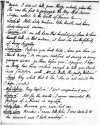
Mind, I didn’t tell, poor thing, nobody pities her[.] She was the first to propogate the story that Serena Simper retir’d to the South of France to —
Lord C.
Hold Lady Rouleau, take breath, and hear Lady Languid’s answer.
Sharply.
Oh! we all know that her Ladyship loves to hear herself talk, in that instance, at least she has the felicity of being Singular
Lady Lan.
Cassino! you look triste – have you been at Church to-day? Or are you mortified at seeing so many younger Ladies go there before you?
Apropos! I hope no-body has been wicked enough to tell you Courtlands flirtation with Mrs. La Belle, the pretty Milliner?
Sharp.
Why whats that to her? She is not ruin’d too, I hope!
Miss Cassino.
Pray Explain! I don’t comprehend you!
Lady L.
Not for the World – I never wounded the feelings of a Friend in my Life.
Lady Rou.
Because you never had one.
Lady Lan.
Besides, I never tell tales, I was desir’d to be discreet, and I hate mischief.
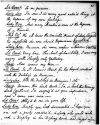
Ld Court.
So we perceive.
Lady Lan.
I’m sure I do many good natur’d things at the Expence of my own feelings.
Lady Rou.
And many ill natur’d ones at the Expence of a Friend’s.
Miss Cas.
We all know the Amiable Heart of Lady Languid[,] tis impossible she ever shou’d Experience Ingratitude.
Lady Rou.
Because she never confers a Favour (Aside)
Ld Court.
Very true. The Soul of Sensibility, I was very angry with Sharply only Yesterday.
Sharp.
Now comes my turn –
Ld. Court.
In St. James’s Street, for his boyish conduct with the Dutchess de Beaujour.
Lady Lan.
With the Dutchess de Beaujour! Oh!
Sharp.
Damme, this beats Boots – I’m in luck this Morning[.] Lord Courtland, I’m surpriz’d at your imprudence, and I never was more —
Ld Court.
Oblig’d to me in your life
Lady Rou.
Sharply. you look disconcerted – I hope you are not a party concern’d, A Lady who could make such a Display in her Dressing Room – and she just rizen
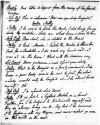
Sharply.
Had little to Expect from the mercy of her female Visitors.
Miss Cas.
This is inhuman! How are you Lady Languid?
Enter Nelly
Nelly.
I be com’d to fetch the Boots, I did bring for my Lady by mistake – Odds me. what have e done to her.
Miss Cass.
Poor Soul, she is stabb’d to the Heart.
Nelly.
O lord! Murder! Fetch the Barber to bleed her[.] Send for a Constable – I do wash my hands on’t – I was n’t in the Room! What will the Crowner
say.
Ld Court.
Have patience – and Assist your Lady.
Nelly.
What to be brought in a party concern’d, I do know a poor body wou’d be sent to jail, for what a Lady would only be laugh’d at – I be almost beside myself! Oh!
Miss Cass.
I’m afraid she’s Dead!
Nelly.
I’ll go fetch a lighted Match, or a burnt Feather,
for I be Subject to Historicals
myself and they do always bring me to – Say but I be innocent[.] I’ll forgive e all my Wagers,
and never molest ye more in this world or the next.
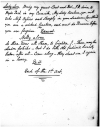
Lady Lan.
Bring my great Coat and Hat – I’ll drive to Hyde Park in my Curricle, My Lady Rouleau, you will take Miss Cassino and Sharply in your Landeau;
Courtland you are a wicked Creature, and must do Penance before you are forgiven
Exeunt
Nelly alone
So then ’twas all Sham, to frighten I. – These may be London frolicks – But I do like Old fashion’d honesty better after all – Come along – they shant see I again in a hurry.
Exit
End of the 1st. Act.
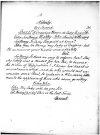
Nobody.
Act Second.
[Nobody: In the manuscript, the handwriting in the second act is different from the handwriting in the first act.]
Scene 1st. A Drawing Room at Lady Languid’s.
Enter Sir Henry Rightly – John shewing the way
Sir Henry.
Is Lady Languid at home?
John.
Yes, Sir Henry, my Lady is Dressing – but I’ll announce your name immediately.
Exit.
Sir Henry.
Is there no way to reform her? – She, who lately was a Model for her Sex, to become the victim of Dissipation! – I know her heart is uncontaminated – and He who would not encounter some Peril, to reclaim a Wanderer, little merits the applause of those who never go astray.
Enter John.
John.
My Lady will see you, Sir.
Sir Henry.
(Aside) This is the last Trial.
Exeunt.
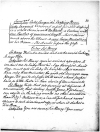
Scene 2nd. Lady Languid’s Dressing Room.
{Lady Languid Discovered as just finish’d dressing in a white Chemise with No Waist – a Turban with one Feather of enormous length. – Short Sleeves much above the Elbows – A very large Medallion at her Bosom – She Stands before the Glass. –
}
Enter Sir Henry.
Sir Henry.
“Belinda smiles – and all the world looks gay.” So says Pope.
Lady Lan.
Sir Henry – you’re arived apropos – to conduct me to Lady Paroli’s – I go there first – shan’t stay – must call on Lady Di Scruple – shall remain there only three minutes; the good old Dowager never plays – ’tis quite impossible to exist where people have so little Taste in their choice of Amusements.
Sir Henry.
Taste – that sets decency at defiance & amusements, that destroy health, fame, & fortune – can excite in thinking minds no other sensation than Pity! – Believe me, a beautiful hand never appears to such disadvantage, as when it shakes a Dice:Box.
Lady Lan.
You are severe, Sir Henry! – You were [Page 29]
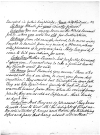
Educated in Gothic
Simplicity; – Your City Virtues –
Sir Henry.
Blush, for your Courtly follies!
Lady Lan.
You are angry, because the World became polite – when you were too old for Instruction.
Sir Henry.
I am old enough, indeed, to be more wise; I ought to banish from my mind, a Woman, whose only pleasure is to give me pain. Lady Languid, I come to bid you Adieu, for ever.
Lady Lan.
Rather Laconic – but perfectly pleasant, I assure you. – I cannot stay to take a formal leave: my Friends wait for me.
Sir Henry.
Your Enemies, you mean! – Those who would not lend an Arm, to save you from destruction! – They would but triumph in your fall. They are like April Suns – Gaudy to look at, but no warmth beams from them; when the voice of Sorrow pleads, they are as cold as Lapland
– their Souls, as dark too.
Lady Lan.
But they are so pleasant! They know so well how to live! – Oh! the delights of Vingt un – the solicitudes of Rouge and Noir
– the trembling hopes and fears that hang about a Dice Box!
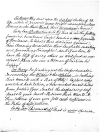
Sir Henry.
Why doat upon the darkest shakes of life – while it presents some bright examples, whose Virtues, make their Rank, their secondary Honor!
Lady Lan.
(Inattentive to Sir H:) Then to see the fritting,
frowning, beauteous Circle! – bending over pyramids of Rouleaus – To behold their delicious Agonies! – their charming anxieties – their laughable vexations, and provoking Triumphs! – and if we lose, to have the bliss of seeing others as wretched as ourselves! – Where else can a Woman of Fashion be happy?
Sir Henry.
In finding out the Unfortunate – In consoling the Widow & the Orphan – in bathing their wounds with a Tear of Pity! – Explore some wretched habitation, where modes merit hides from public Eyes – Snatch the despairing sufferers to your heart – Relieve their Wants - & then tell me if ever you felt such rapture in the Paths of dissipation.
Lady Lan.
(disconcerted) That is your opinion – [Page 31]
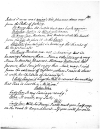
Indeed it once was mine; till pleasure drew me from the Paths of feeling.
Sir Henry.
Then let Justice lead you back again.
Lady Lan.
Justice is blind you know.
Sir Henry.
Yes, Madam, but Nature stole the Jewel from the Eye to place it in the heart.
Lady Lan.
You delight in hearing the thanks of the Unfortunate
Sir Henry.
Pardon me – not in hearing – but in knowing I deserve them. – I am a voluptuary – a very slave to mental pleasures. – Fortune bestowed her favours, that I might enjoy them – And, may I sink from the extreme of rapture, when I cease to share it with the Children of Calamity! –
(Lady Languid rings the Bell to conceal her emotion)
that Tear is worth a Million!
Enter John
Lady Lan.
Is my Carriage ready?
John.
It waits, my Lady.
Exit.
Lady Lan.
Well, Sir Henry, I will meet you half way – on the road to Amendment. – If you will for once [Page 32]
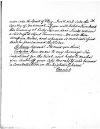
enter into the Spirit of Play – I will sink into the Apathy of Sentiment. – If you will hold a Faro:Bank
this Evening at Lady Squander’s – I will relieve a distress’d object Tomorrow – We will then compare Notes, and whoever is most satisfied shall be proclaimed the Victor.
Sir Henry.
Agreed! – I’ll meet you there.
Lady Lan.
Now see me to my Carriage – I’m impatient for the trial – and hope to make you shake off your City Morality – and become a Constellation in the higher Spheres!
Exeunt.
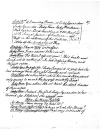
Scene 3rd. A Drawing Room at Lady Squanders
[Scene 3rd: corrected from "2nd" in the manuscript]
{Lady Squander – Lady Faro – Lady Rouleau – Miss Casino – Lord Courtland & Mr. Sharply with Several persons of Fashion. – all drest in the extreme of the Fashion. Discd. some of the Company at Play.}
Sharply.
I have two witnesses.
Lady Faro.
I can never believe it.
Lady Rou.
’Tis true, I assure you! – This beats our Camp all to nothing! – In her Dressing Room, and she just risen.
Lady Squ.
Impossible! Lady Languid is gay; but she has always been thought Lovely and correct.
Lady Rou.
As a Sun:Dial; where borrow’d Splendour only serves to mark the progress made by Time.
Lady Faro.
You allow her at least the dark shades of Character.
Lady Rou.
Indeed I’m glad Lady Squander is her Friend; for I believe, she wants one
Enter Sir Henry Rightly.
Sir Henry.
I am sorry to hear it!
Lord Court.
(affectidly.) To hear what, Sir Henry?
Sir Henry.
(contemptuously.) That any intimate of [Page 34]
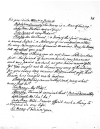
this gay Circle Wants a friend.
Miss Casino.
(Seriously.) Sir Henry is a Man of Feeling!
Lady Rou.
Rather say a Cynic!
Lady Squan.
A very Pedant!
Sharply.
An Anchoret! – A Quiz of the first order! – a second Scipio! – A Melange of incomprehensibles; the very Salmagundi of moral Maxims
– Pray, Sir Henry, tell us what you are?
Sir Henry.
A Thing, you do not know – a Philanthropist: – the friend of human:kind; my pleasures and my pains are such, as you have never felt. Yet You ought not to blame my way of thinking; for you every day receive the proudest gift, that Heav’n has taught me to bestow.
Sharply.
(smiling conceitedly.) And pray, what may that be?
Sir Henry.
My Pity! –
Sharply.
Damn’d comical that! (retires disconcerted.)
Lord Court.
Ha! ha! ha!
Lady Rou.
Well – I never offer’d such a thing to a Friend in my life.
Sir Henry.
I believe you.
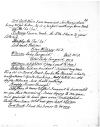
Lord Court.
When I am Married – Sir Henry shall be my Wife’s Tutor – he is a perfect walking Horn:Book.
All.
Ha! ha! ha! –
Sir Henry.
I love a Book; – the Title I leave to your Lordship.
Sharply.
Ha! ha! ha!
Lord Court. Retires.
Enter William. P.S.D.
William.
Lady Languid! Exit. P.S.D.
Enter Lady Languid. P.S.D.
All (seem delighted & pay court to her.)
Lady Lan:
Such an accident! – Overset my new Vis-a vis
in Bond Street – broke the Pannel – what a misfortune! – Quite Shocking – Half kill’d an old Apple:Woman
– but that’s nothing.
Sharply.
Queer Enough!
Lady Faro.
A mere trifle! – I meant to have call’d on you this Morning – I was dying to see you – and griev’d to hear you were indisposed – Lady Rouleau told me you had Visitors
Lord Court.
I had the honor to be one.
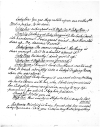
Lady Lan.
Yes – yes – they call’d upon me rather Mal-a-propos, to be sure.
(Lady Lan: talks apart with Miss Cas: & Lady Rou:)
Sharply.
(Looking at Lady Languid.) She looke devilish handsome! – I’ve a great mind – But then she’s done up – No, – damme I won’t.
Lady Squan:
She seems confused! – the thing is clear enough – Can’t be a doubt about it.
Lady Faro.
Evidently! – don’t give it up!
(Lady Lan. & Miss Cas. come forward.)
Lady Squan.
I thought Lord Courtland was too well bred, to break abruptly into a Lady’s Dressing Room, when she was alone!
Lord Court.
Lady Languid was not alone, Madam, she had a Person with her, who, I believe, occasioned her Ladyship some confusion, owing to my appearance; for which I beg her pardon.
Sharply.
I told you so.
Miss Cas.
How easily a Reputation may be lost. (Aside)
Sir Henry.
Mischief is busy – I must stop her course, Lady Squander – Did you receive my note, requesting [Page 37]
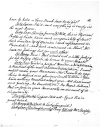
have to hold a Faro Bank
here to:night?
Lady Squan.
I did – and everything is ready in the next Room.
Lady Lan.
(Coming forward) Well, this is Elysium! People of Taste have such congeniality of Soul! such similarity of opinion! – such refinement in Friendship – and such sentiment in Love! – We have no feelings but for each other.
Sir Henry.
True! – But would not a little feeling for less Happy Objects, do honor to your Hearts?
Lady Rou.
You’re a perfect Mentor – a diciplinarian – A Martinet of the most Austere description. – I won’t enlist under your Banners
– Tho’ I wou’d do anything to defend our glorious Constitution! – You have nothing Martial about you – All Sentiment and feeling – No Emulation! – No Heroic Ardour! But we forgive your Humanity on account of its singularity.
Sharply.
(Aside) Suppose I tell all – Egad I’ve a great mind.
Sir Henry.
(Whispers to Lady Languid.)
Lady Lan.
(Contemptuously) Pray tell all Mr. Sharply; [Page 38]
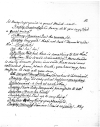
Sir Harry says you’ve a great Mind – and –
Sharply.
(Insolently) Sir Harry, did you say I had a great mind?
Sharply.
Very good! – that’s not bad! – damn’d rude tho! –
All.
Ha! ha! ha!
Lady Faro.
Well, but, there is something to tell then?
Lady Lan.
This is evil insinuation! – More slander is daily drawn from innuendo than ever was extracted from plain truth; you have my permission to tell all you saw.
All.
(except Sir. Henry & Lady Lan:) Let us hear it! Let us hear it.
Sharply.
Nay! ’tis only what happens everyday.
All.
(alarmed – a look at each other.)
Sharply.
I have Lady Languid’s permission to tell?
Lady Lan.
(Bows her head)
Sharply.
(aside) She’s up to any thing!
Lady Lan.
Any thing you please, Sir.
Sharply.
(Solemnly.) Damme! I said so.
– Why [Page 39]
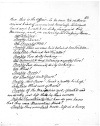
then – this is the Affair – To be sure ’tis rather a serious kind of a comical Business. – Lord Courtland and I, call’d on Lady Languid this Morning, and, on entering her dressing Room –
All.
(Whisper.)
Sharply.
Silence!
All.
(Eagerly) Well!
Sharply.
There we saw hid behind her Toilette –
Lady Faro.
Behind her Toilette!
Sharply.
Two dirty looking –
All.
(Astonish’d and listening eagerly) Two!
Sharply.
Two, damn’d, dirty looking –
All.
What?
Sharply.
Boots!
All.
(Starting) And Spurs?
Sharply.
And Spurs! – Here’s a pretty kickup!
Lady Faro.
What sort of Boots?
Sharply.
Of the Masculine sort; splash’d – and evidently just left there by their owner.
Miss Cas.
(Sarcastically) But how do you know that they were Masculine Boots?
Sharply.
They were Jack Boots
– left in a hurry, [Page 40]
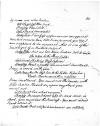
by some one who had –
All.
(Eagerly.) Who had –
Sharply.
Vanish’d!
All.
(Stand amazed.)
Lady Lan.
I confess appearances are against me; but remember, till I am proved guilty, I am supposed to be innocent – this is one of the privileges of a British subject.
Lady Rou.
But we lose time, Ladies – Let’s to Cards.
Lord Court.
(leading Miss Cassino)
Sharply.
Here’s a pretty Commence!
– Courtland – I say – a word with you! –
Lord Cour: {Hands Miss Cas: to the Table – Kisses her hand – Bows – and then returns}
I say Courtland – You must not Philander with Little Casino – ’Twon’t do; upon my Soul you must not.
Lord Court.
For what reason?
Sharply.
Because I dont like it – and – and – in short – you must cut the Business – You must indeed[.] I can’t allow it.
Lord Court.
But all preliminaries are settled, [Page 41]
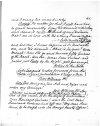
and I marry her immediately.
Sharply.
No matter for that, I will have her – to speak reasonably – I say ’tis damn’d ridiculous, and damn’d rude – to think of any woman that I am in love with ’tis a thing I never suffer –
Exit Lord Courtland retires to Table
and besides, I know Cassino is in love with me, and ’tis damn’d – What, is he gone? – Queer enough! Now I’ll go and borrow fifty Guineas of the Bank – lose Ten – swear I am ruined – and pocket just Forty by the night – good fun enough.
Retires to the Table.
{Lady Languid rushes forward from the Table in great perturbation & rings a Bell.}
Enter William P.S.
Lady Lan.
Bring me, pen Ink and paper – and order my Carriage!
Exit William P.S. who returns immediately with Pen Ink and Paper}
This is too cruel; to be the dupe of such a Stoic! – Nine Thousand Guineas! – and the last nine thousand Fortune had left me! My dear Rouleaus, to be stuff’d into Sir Henry’s Musty Coffers! – [Page 42]
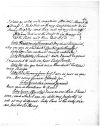
I shall go wild with vexation.
– There’s the Draft! – Take this with my compliments to Sir Henry Rightly – and then call up my Carriage!
{William delivers the Draft to Sir Henry at the Table and then Exit P.S.D. — }
Lady Faro.
(Coming Forward) My dear Languid, why are you so childish? (Speaking Soothingly.)
Lady Lan.
I am undone! ruin’d entirely!
Lady Faro.
(Coldly.) Indeed! Well, I must be gone[.] I promised to call on poor Lady Paroli.
Lady Lan.
Can you lend me a Hundred? Fortune may Change.
Lady Faro.
(Turning from her) I am as poor as you are – lost every Guinea I play’d for.
Lady Squander comes forward.
[Lady Lan.]
Have you a Rouleau to spare?
Lady Squan.
(Gravely.) I owe more than I have won; and while I am in debt, my property is not at my disposal. Lady Faro is the only winner, besides Sir Henry.
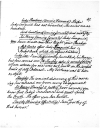
Lady Rouleau.
(Coming Forward) I hope Lady Languid has not levanted;
she owes me an hundred.
Lord Courtland.
(Coming forward) And me Fifty.
Sir Henry.
(Coming forward.) Lady Languid, you have made me this Night your Banker
{Miss Casino offers Lady Languid her Pocket Book, which she refuses & Curtsies}
Lady Lan.
I am Sufficiently humbled, Sir Henry; – but here comes one
whose esteem for me was not built on the sordid basis of self:Interest – My Fortune was to him no object.
Sharply.
The comical discovery of this morning has released me from every Engagement.
Sir Henry.
(Sternly) A paltry, poor excuse; you know that Lady’s innocence and must speak the Truth. She offers you her hand? –
Sharply.
(Bowing Affectedly.) I am not worthy of that honor!
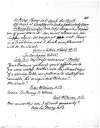
Sir Henry.
I knew he’d speak the Truth.
All laugh at Sharply who looks particularly Grave
Sir Henry.
(Seriously.) Now, Lady Languid, I remind you of your promise – you must relieve an unhappy object – Let me point one out. There is a Direction; and I think our pleasure will be Mutual.
Gives a Letter & Exit. P.S.D.
The Company retire.
Lady Lan.
My Draft returned! – (Reads) “Your Fortune without your Affection, to me were useless – neither can the advantages of a Gaming Table, compell me to distress an amiable, tho’ misguided Woman.” –
Who waits?
Enter William. P.S.D.
Desire Sir Henry to return.
Exit William. P.S.D.
How unworthy am I of such generosity! –
Enter Sir Henry. P.S.D.
[Page 45]
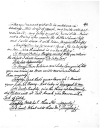
Sir Henry, I cannot yield to be outdone in kindness – This draft of your’s – my pride will not receive it; – my folly must be punish’d – Point out a Being who wants the little I have left and I will share it with him. (He refuses the Draft.)
Sharply.
(Coming forward) Egad I’ll take pity on her – nine thousand is no bad thing! –
Sir Henry.
(Putting Sharply aside) Will you relieve the object I shall name? (To Lady Lan)
Lady Lan.
Assuredly!
Sir Henry.
Then believe me Lady Languid, ’till you are mine, no Man exists more wretched than myself!
Sharply.
Egad that’s queer Enough! – Mind your hits, Sir Harry – that Lady is Engaged to me.
Lord Court.
Sharply, give the thing up handsomely – old Plutus
will at last Knock you down with a Sack of Gold.
Sharply.
Will he? – then I’ll – (angrily)
Lord Court.
What wilt thou do? (Laughing.)
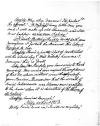
Sharply.
Why – why – Damme! I’ll pocket the affront! (to Miss Cas.) Come Little One, you and I will make up old Quarrels – and will be as happy – as we can. (Sighing)
Lord Court.
(Putting Sharply Aside) With your permission I forbid the Banns:
this Lady is Engaged to me.
Sharply.
Here’s a pretty spot of work! What will the world Say? Will Nobody have me? – Damme! This is Droll
Lady Lan.
Mr. Sharply, you have only to thank yourself – How could you expect the confidence of that Sex whose virtues were the subjects of your Slanders – remember that the wreath of Social Intercourse ever blooms most grateful to the sense when it is divested of the Thorn of ill:Nature.
Sharply.
Comical Enough!
Nelly without P.S.D.
Nelly.
I will come in! – I will see my Lady!
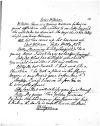
Enter William.
William.
There is a Young Woman below, in great Affliction who wishes to see Lady Languid[.] She will take no denial – she says she is her Ladyship’s waiting:Woman.
All.
Let her come up – Let her come up.
Exit William. Enter Nelly. P.S.D.
Nelly.
(Running to Lady Languid) I be a gowan
home – I won’t tarry no longer. (Crying.)
Lady Lan.
What has distress’d you child? – You might have staid till my return
Nelly.
No, but I won’t – I ben’t used like a Christian I ha’ took a place in the flying Waggon & my Box
is gone before me
Sharply.
I wish I was in it – for I’m in the wrong Box
here.
Lady Lan.
That will satisfy you. (gives Money)
Nelly.
– By gingo! Five Golden Guineas. By Jingo I’ve had many fine promises but a Bird in the Hand is worth Two in the Bush.
Epilogue.
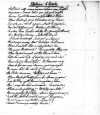
Epilogue to Nobody.
Half dead, and scarce recover’d from my fright,Once more I come to bid you all good night,For ere I quit this vast and Splendid placeWhere kindness gives to Candour ev’ry Grace,To make you smile again, shall be my Aim,5My Zeal to please you, Nobody will blame,For when keen Malice strikes the grateful Heart,Sure Nobody will say – I shot the dart.A Truce to sadness. Is it not a shameWhat ever’s wrong, that Nobody’s to blame,10When Scandal bids a reputation dieWho gave the wound? “’Twas nobody they cry.When Modest merit at the Miser’s door,Tells his sad Tale of mis’ry, o’er and o’er!“Your Lord is Bountiful” – the Mourner cries15“Bear to his ear my sorrows, and my sighs“He never lets the child of Genius roam,The Porter answers, “Nobody’s at home”!When Mistress Button from her Spouse is goneTo see the Play with Honest neighbour John.20“This” – says her Lord and master, “Is not well;“Where is she gadding?” Nobody can tell!Home sneaks the Lady; spouse begins to rave;“I wish the foolish wretch were in her grave;”“Do not say so, my Button, If you died25“Indeed I’d marry nobody beside”!
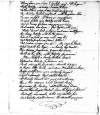
“Where have you been? – Confess and I’ll forgive?“With Nobody, – or may I cease to live!“So then I find, when I am dead and gone,“You’ll play the fool, my duck, with Neighbour John;“For you confess’d – If I were in my grave,5“In spite of fate, you Nobody wou’d have;“And if I may believe my eyes are true,“That nobody, has been – this Night with you”.“Well! do not look so fierce, and rave and Curse;“For Lovey, Nobody will be the worse;10“Indeed I’m fond as any wife can be,“And Nobody prefer, my dove, to thee!“Yet I dare swear you do!” – She cries he Pouts;A kiss dispels his Rage; – a Smile, his doubts:Then Spousy promises, to cure his Sorrow,15She’ll do the like, with Nobody to morrow!When I behold a lovely British Maid,Depend on Nobody, for fashion’s aid,I think she’s right, for nature shrinks to gaze,On Shapes like Dolls, – cas’d up in Whalebone Stays;
Whalebone Stays: pieces of whalebone used to stiffen corsets.20
Hoops of stiff Cane,
Hoops of stiff Cane: Hoop petticoats were fashionable during the eighteenth century and required the use of cane, which was inserted into sewn channels around the width of the petticoat.were certainly design’d –
To hide deformity that stalk’d behind! –Let Beauty banish Art, and all will say,This is the charm, to hold Eternal Sway,And may the Virtues! still to Briton’s dear!25Snatch their bright Model – from the highest Sphere!But soft, – one smile, to bid our Author live

